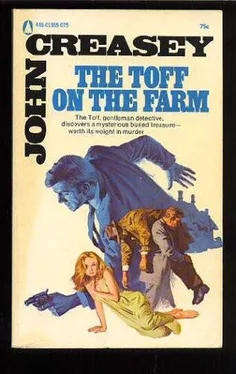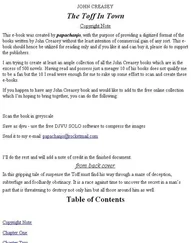John Creasey - The Toff on The Farm
Здесь есть возможность читать онлайн «John Creasey - The Toff on The Farm» весь текст электронной книги совершенно бесплатно (целиком полную версию без сокращений). В некоторых случаях можно слушать аудио, скачать через торрент в формате fb2 и присутствует краткое содержание. Жанр: Старинная литература, на русском языке. Описание произведения, (предисловие) а так же отзывы посетителей доступны на портале библиотеки ЛибКат.
- Название:The Toff on The Farm
- Автор:
- Жанр:
- Год:неизвестен
- ISBN:нет данных
- Рейтинг книги:5 / 5. Голосов: 1
-
Избранное:Добавить в избранное
- Отзывы:
-
Ваша оценка:
- 100
- 1
- 2
- 3
- 4
- 5
The Toff on The Farm: краткое содержание, описание и аннотация
Предлагаем к чтению аннотацию, описание, краткое содержание или предисловие (зависит от того, что написал сам автор книги «The Toff on The Farm»). Если вы не нашли необходимую информацию о книге — напишите в комментариях, мы постараемся отыскать её.
The Toff on The Farm — читать онлайн бесплатно полную книгу (весь текст) целиком
Ниже представлен текст книги, разбитый по страницам. Система сохранения места последней прочитанной страницы, позволяет с удобством читать онлайн бесплатно книгу «The Toff on The Farm», без необходимости каждый раз заново искать на чём Вы остановились. Поставьте закладку, и сможете в любой момент перейти на страницу, на которой закончили чтение.
Интервал:
Закладка:
Occasionally his lips twisted in what might have been a smile, and as easily a spasm of indigestion.
Suddenly, he got up, went out of the kitchen into the big front room, went to the window, moved the blind a fraction, and peered out. He could see a light in the sky, and knew that car headlamps were still on near the cottage, with the proof that the police were still there. He let the blind fall and returned to his chair, dropped heavily into it, and then took out a large silver watch from his fob pocket, thumbed the glass, and peered at the hands. It was nearly one o’clock in the morning.
He yawned.
Then he heard a creak of sound and darted a suspicious glance towards the ceiling. The creak wasn’t repeated. He continued to glare upwards until his head drooped, and his chin almost touched his chest. His breathing was heavy and rasping, now and again he snored.
He was not aware of the man who appeared in the doorway, silent as a wraith but nothing like a wraith to look at. In fact he looked like an East End dock worker who had lost his way. He stared at the old man’s bowed head and bent back, and smiled faintly at the snoring. He stepped closer, taking the palm gun out of his pocket as he did so.
He stood looking down at Old Smith, who had been so adamant about leaving Selby Farm.
“Now why don’t you want to leave, Smithy?” asked Rollison, and continued to stare at the old man’s head. He asked the question silently, and the only sound was Smith’s breathing. The night was silent, too. Rollison had got in at a window. He had seen a policeman in the garden, but the man had been easy to evade. In the morning he would get into trouble from Keen or Bishop, but he would get over that.
Rollison moved the palm gun until it was just at the side of Smith’s face, and pressed the trigger gently. There was scarcely a hiss of sound, and no more vapour than there would have been from an atomiser. The old man paused in his breathing once, and after that appeared to breathe steadily and silently,
Rollison put the gun back into his pocket.
He stepped to the back door, and saw that the huge key had been turned in it, and that it was bolted and chained. With extreme care, he drew bolts and pulled the chain out, then turned the key: and the turning made the greatest sound. He opened the door a fraction and listened, but saw no sign of the patrolling policeman, nor did he hear him. He stepped into the garden, and drew the door to behind him, without closing it. He looked towards the cottage. No lights showed above the trees now, for except for a guard back and front, much more thorough than the guard at the farm, no police were there.
Footsteps sounded.
Rollison waited in the dark shadows. The policeman, in plain clothes, was angled for a moment against the sky. He drew nearer, glanced at the door, but did not think of trying it or of going nearer.
He passed, slowly.
Rollison went back inside, hurried to the old man, and lifted him bodily: Smith did not stir or make a sound, he was in a drugged sleep now. Rollison took him outside and across the farmyard with its earthy and its animal smells. Just behind a gate in a nearby field there was a rustle of sound.
“That you, Mr. Ar?” a man inquired in a rich Cockney voice.
“Hallo, Sam,” said Rollison. “How would you like to be a farmer?”
“Not so-and-so likely, the smell’s more’n enough for me,” said the man named Sam. “I’ll buy me eggs from the shop, ta. Got ’im?”
“Yes. Take him and look after him well, he might be precious,” Rollison said. “You know where to go with him.”
“Everything’s okay, Mr. Ar,” said the man named bam, and another man appeared by his side and echoed : “Sure, it’s okay.” Rollison handed over the unconscious man, and then stood and watched the two men from London’s East End as they carried Smith on a chair which they made with their arms, until the strange little group disappeared from his sight.
Ten minutes afterwards, some distance off, a car engine started up, whined for a few moments, and then moved off; but oddly, there was no light in the sky to show the beam of head-lights.
Rollison turned back to the garden. The policeman was on the way round again, and this time smoking a cigarette : the smell of tobacco smoke came temptingly, but Rollison resisted temptation, and waited until the man was round the nearest corner. Soon he went to the kitchen, locked up as securely as Old Smith, then turned out the oil lamp and, using a torch, went up the narrow stairs. He had seen the condition of the farmhouse during the day, and knew that it was messy enough, but he pulled off his boots, loosened his collar and tie, then sat down in an old armchair, and closed his eyes.
“Six o’clock should be early enough,” he said in a soft whisper. “I’ll wake at six.” Soon, he was asleep.
He slept with the door open, and the knowledge that he would wake at the slightest sound, for the years had taught him how to be asleep one moment, and wide awake the next. No sound disturbed him. At two minutes to six by the watch on his wrist, he began to stir, his eyelids flickered, and he moistened his lips. At one minute past six he opened his eyes wide and stared about him : then grinned.
“I’ll bet there’s no hot water,” he said, and pushed back a blanket he’d pulled over him, and got up. He washed in cold water, but made no attempt to shave. He put a kettle on the oil stove downstairs, and then went into Smith’s room and examined his wardrobe. It wasn’t extensive, but there were two jackets and three pairs of breeches. He found the breeches a little too big round the waist but the Norfolk jacket wasn’t a bad fit. He took off his scarf, but did not put on a collar and tie : Old Smith didn’t wear one.
Smith’s shoes were much too small for Rollison.
“Mine’ll have to do,” he said aloud, and then pulled his own cap over his head, for he could not persuade himself to wear the old man’s. By the time he had finished, the kettle was singing downstairs. He made himself tea, found biscuits and ate two, and then went into the big room. He pulled the blinds up sufficient to allow light in, but not to permit anyone to see inside, and then he began to search the room.
A squad of police would not have been more thorough.
He moved furniture and pictures, stepped inside the huge fireplace, put his head up the chimney, and tapped the inside walls. He felt every wall for loose bricks or loose plaster, and tapped the floor of the fireplace, too. Everything seemed solid. He went down on his knees and tested the floorboards, seeking any evidence that one had been taken up lately. He found none. He studied the furniture, trying to judge if any had a false drawer, or other secret hiding-place. All this took him over forty minutes, and at the end of it he was frowning.
“That’s one blank,” he said sotto voce, and then went into the kitchen and did exactly the same thing.
He found nothing.
He searched the pantries and the cupboards, then turned his attention to the stairs. There was a narrow cupboard underneath them, but it contained only a few old boxes and old clothes. The floor was solid, and looked as if the boards had been undisturbed since they’d been laid, over a hundred years ago.
“Two blanks,” he said, a little less cheerfully, as he went upstairs.
At half past seven he had finished his search of the farmhouse, and had found nothing to explain the sensational interest in it. He was hungry as well as disappointed when he went downstairs. He drew the blinds a little, so that anyone who wanted to see inside would have to come close to each window, and then went into the kitchen, opened the back door, and hobbled out, shoulders bent and head towards the ground. A man called : “Good morning, Smith.”
Читать дальшеИнтервал:
Закладка:
Похожие книги на «The Toff on The Farm»
Представляем Вашему вниманию похожие книги на «The Toff on The Farm» списком для выбора. Мы отобрали схожую по названию и смыслу литературу в надежде предоставить читателям больше вариантов отыскать новые, интересные, ещё непрочитанные произведения.
Обсуждение, отзывы о книге «The Toff on The Farm» и просто собственные мнения читателей. Оставьте ваши комментарии, напишите, что Вы думаете о произведении, его смысле или главных героях. Укажите что конкретно понравилось, а что нет, и почему Вы так считаете.












